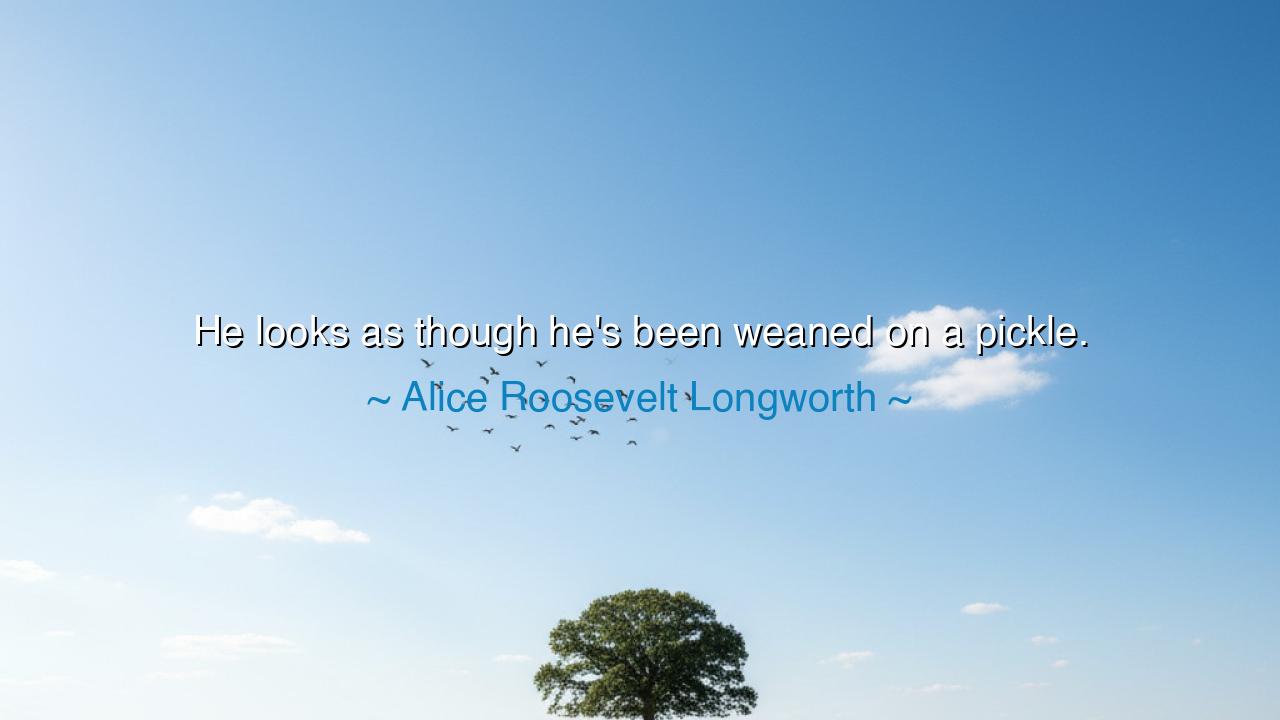
He looks as though he's been weaned on a pickle.






In the golden corridors of American wit, where words were sharper than swords and laughter carried the weight of truth, Alice Roosevelt Longworth, daughter of President Theodore Roosevelt, once delivered a line that has outlived her century: “He looks as though he’s been weaned on a pickle.” At first glance, the image draws laughter — a face soured from birth, lips pursed in eternal disapproval, eyes narrowed by suspicion or bitterness. Yet behind its humor lies a profound insight into human nature. For what she describes is not merely a countenance, but a condition of the soul — that of the perpetually dissatisfied, the spirit so steeped in cynicism that even life’s sweetness turns sour on the tongue.
The origin of this saying belongs to the salons and drawing rooms of early twentieth-century Washington, where Alice Longworth reigned as both queen and court jester. Known for her fearless tongue and her refusal to flatter the pompous, she wielded language like a rapier — elegant, lethal, and dazzlingly precise. When she said that a man “looked as though he’d been weaned on a pickle,” she was not merely mocking his appearance but exposing the temperament that had shaped it. For to be weaned is to be nurtured, to be fed at the beginning of life — and so her remark suggests that this man’s very sustenance was bitterness itself, that his nature had been nourished not by joy, but by resentment.
The pickle, in its salt and vinegar, becomes the perfect symbol of the sour spirit — one who has tasted too much of criticism and too little of compassion. Such a person, hardened by cynicism, forgets the flavor of kindness. History has known many such souls: those who, though alive among others, carry clouds wherever they walk. Consider Thomas Hobbes, the philosopher of the seventeenth century, who declared that the life of man is “solitary, poor, nasty, brutish, and short.” His mind, though sharp as steel, saw only the shadow side of existence. He was, in the spirit of Longworth’s jest, one weaned upon a pickle — a man whose genius was fed on bitterness rather than wonder.
And yet, we must not take Longworth’s words merely as mockery, for in her jest lies a warning. The face she describes is one that any of us might wear, should we allow bitterness to become our nourishment. The ancients taught that the soul takes the shape of what it consumes — that a life fed on complaint produces a heart of vinegar. As laughter purifies sorrow, so bitterness amplifies itself, souring the spirit until joy cannot take root. Longworth’s image, vivid and humorous, reminds us that the way we feed our hearts will shape the way the world perceives us. One need not be told what one feels; it is written in the very lines of the face.
There is wisdom, too, in remembering that bitterness is born not only from hardship but from pride. Many who seem perpetually displeased are those who feel the world owes them sweetness and are affronted when it offers salt. The philosopher Marcus Aurelius warned against this disease of expectation, writing that the wise man learns to accept the flavor of life as it comes, neither recoiling from its sourness nor craving its sugar. To be “weaned on a pickle,” then, is to have never learned that balance — to remain forever the infant of complaint, the child who rejects nourishment because it is not sweet enough.
But contrast this image with another: the one who has tasted hardship and yet laughs, who finds joy in small things and warmth even in the cold of the world. History is filled with such souls — Helen Keller, blind and deaf, yet radiant with gratitude; Nelson Mandela, imprisoned for decades, yet emerging with a heart free of hatred. These are the ones who, though fed by suffering, transformed it into strength. They remind us that life’s bitterness, when accepted with courage and humor, can become medicine rather than poison.
So, O listener, take heed of Alice Roosevelt Longworth’s jest and its hidden wisdom. Guard your spirit against the sourness that ages the soul before its time. Do not be weaned on a pickle, but on patience, gratitude, and laughter. When disappointment comes — as it surely will — taste it, learn from it, but do not let it season your every meal. Speak kindly, even when the world tempts you toward sarcasm. Smile, even when it would be easier to sneer. For a cheerful heart, said the ancients, is a fountain of life; while a bitter one is a drought that dries its own source.
And thus, when your face is read by those who pass you on the road, let it not be the face of one who was raised on vinegar, but of one who has drunk deeply of the sunlight of the world — one who, like Longworth herself, can laugh at folly without becoming it. For humor, when rooted in grace, redeems what it mocks. And laughter, when joined with wisdom, is the antidote to all the world’s bitterness.






AAdministratorAdministrator
Welcome, honored guests. Please leave a comment, we will respond soon